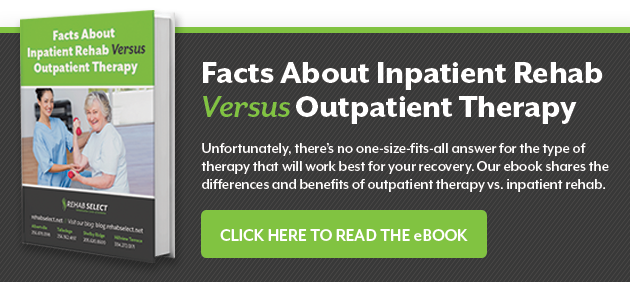
An adverse drug event (ADE), according to the Office of Disease Prevention and Health Promotion, is “an injury resulting from medical intervention related to a drug. This includes medication errors, adverse drug reactions, allergic reactions, and overdoses.”
ADEs happen more often than you think, both in our community and nationwide. A study in the Journal of Patient Safety found that around 13% of 30-day hospital readmissions were caused by ADEs – of those, over 80% were serious, and nearly 93% were preventable. From an outpatient perspective, ADEs account for an estimated 1 million emergency department visits and over 3.5 million physician office visits each year.
This may include patients who were previously in a rehab program for any number of reasons, such as, stroke, pulmonary, cardiac, or wound care. A patient may be on medications for any of these conditions, or perhaps even a condition beyond the reason they were in rehabilitation.
At any rate, there are a few reasons why patients have adverse drug events, common medications that cause them, and finally, ways patients can prevent them in the future. In this article, we’ll explore each of these.
Reasons Patients Are Having Adverse Drug Events
With more than half the US population on a prescription medication, it’s perhaps not surprising that ADEs impact more than 7 million people a year. Many patients are prescribed four or more medications, as well as over-the-counter drugs. The sheer volume of medications being used by U.S. patients creates complex medical scenarios, triggering a growing risk of an ADE. The most common causes of adverse drug events include:
1. Prescription Errors
Perhaps the most troubling cause of adverse drug events are those caused by prescription errors. A research study into 30-day hospital readmissions found that half of all readmissions caused by drug events could be attributed to patients being given the wrong prescription. This is particularly the case for diuretics, analgesics, and anti-thrombotics.
2. Reconciliation Errors
For patients taking multiple medications, medication reconciliation is a major issue of concern. The Joint Commission’s report on Hospital National Patient Safety Goals identified medication reconciliation as a top priority. If patients are taking multiple medications, there can be a risk that some of these treatments could interact badly, causing health issues for the patient. This can be particularly problematic when the patient moves from one care setting to another, such as leaving the hospital and entering an outpatient program.
3. Patient Errors
The remaining 50% of ADEs are caused by patient error. Patients may misunderstand their doctor’s instructions, forget how much of a given medicine they have already taken, or mistakenly take too much or too little of their prescription drugs.
Patients may also forget to tell their prescribing physician about all the medications they are taking, resulting in negative side effects from combining two or more incompatible drugs. Finally, some people may simply decide not to take their prescribed medication as their doctor recommended; a study from the Journal of the American Pharmacists Association found that, of the hospital readmissions caused by adverse drug events, nearly 1 in 4 were the result of “non-adherence due to patient choice.”
Common Medications That Cause Adverse Events
While an ADE can occur with almost any type of medication, there are a few common ones that often cause issues. These medications include:
- Inhalers – Studies show that many COPD patients misuse their inhaler. Typical mistakes include not assembling the inhaler correctly and not completing the full process of inhaler use (e.g. not breathing out fully). Using an inhaler incorrectly can be dangerous and may mean the patient ends up back in hospital. Learning how to use an inhaler properly is vitally important.
- Anti-coagulants (Blood Thinners) –Anti-coagulants are qualified as “high-risk.” While these drugs can be life-saving for some patients with heart disease, they also carry serious risks of causing bleeding and hospital readmission.
- Diabetes Medications - When managing Type 1 or Type 2 diabetes, either with insulin or a drug like Metformin, patients can have an ADE when taking either too much or too little of a medication to manage their blood sugar.
With too much insulin, blood sugar levels may go too low; this can cause a number of serious issues, including the potential risk of seizures or a coma. With high blood-sugar levels from too little insulin or medication, patients also are at risk for a coma or other life-threatening conditions when medications are not used correctly over a long period of time.
- Pain Medications (Opioids) – Opioids are widely used to manage pain. Commonly prescribed opioids include oxycodone (OxyContin®), hydrocodone (Vicodin®), codeine, morphine, and many others. However, while these medications are generally considered safe for short-term use, the National Institute on Drug Abuse cautions that regular use of opioids, even when prescribed by a medical professional, can lead to addiction – and misuse can cause overdose or even death. The Journal of American Medical Association also reports high levels of ADEs associated with opioid use during surgery.
How to Prevent Adverse Drug Events
While adverse drug events are on the rise, there are ways to reduce the risk that you will experience an ADE. Here are a few suggestions:
- Keep a log of every drug you are taking and how much you take. Make sure to share this with every medical professional involved in your care. Also ensure that your loved ones have this information available in the event that you become too ill to manage your own healthcare needs. Before adding any new prescription medications to your regular healthcare regime, make sure that the prescribing physician has reconciled this drug to the others you are taking.
- Don’t forget to include over-the-counter medications that you take regularly. Many of these can have adverse reactions when combined with prescription meds.
- Follow the instructions you are given when you receive a prescription. If you are in any way unsure about how to take your medications or use medical devices such as inhalers, make sure you ask your healthcare professional.
- If you are leaving the hospital after major surgery, or dealing with a serious chronic or acute condition such as a stroke, COPD, heart disease or a non-healing wound, you may have an extensive list of medications to manage your condition.
In many cases, it may be advisable to consider a rehabilitation program. One of the many benefits of a physical rehab program is that your team of rehab professionals will help you manage your medications, keep track of how many medicines you have, and when you should be taking them. They will ensure that your medical regime is appropriate and safe, make sure you are aware of any potential risks and how to minimize them, and provide you with training on how to use your medication properly.
If you’d like to learn more about how the team at Rehab Select can help you manage your medications and avoid adverse drug events, please contact us here or see our website for more information on our rehab programs.





